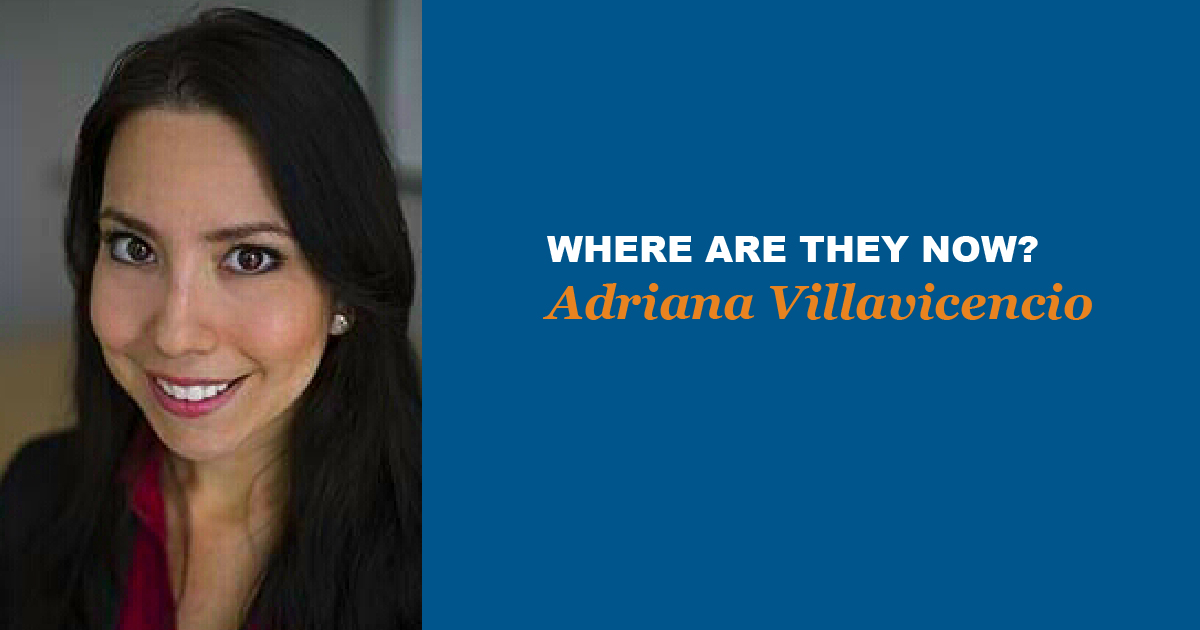A Q&A with Adriana Villavicencio, 2009 MDRC Doctoral Fellow
Where Are They Now?

This is the seventh in a series of Q&As with past participants in MDRC’s Gueron Scholars Program in which they reflect on their experiences at MDRC and discuss what they’re up to today.
 What is your current position?
What is your current position?
In the fall of 2019, I took a faculty position in the School of Education at the University of California, Irvine. I am currently conducting a three-year, mixed-method study on schools that serve recently arrived immigrant youth and an evaluation of an anti-racist teacher training program embedded in culturally diverse elementary schools. I am also teaching doctoral courses in Advanced Qualitative Methods and Immigration and Schools.
What professional positions have you held since leaving MDRC? What was the nature of that work?
For nearly a decade, I served as Deputy Director of the Research Alliance for New York City Schools at NYU — a research-practice partnership with the New York City Department of Education. At the Research Alliance, I helped shape the organization’s research agenda, developed relationships with external partners, and led many of the organization’s large-scale research projects focused on the NYC school system. More specifically, I conducted several studies focused on policies and practices that contribute to successful schools, including “turnaround” middle schools and the city’s small high schools of choice. I also served as principal investigator of an evaluation of the Expanded Success Initiative, a precursor to My Brother’s Keeper and one of the country’s largest initiatives targeting black and Latino male students.
Why did you choose to apply for and accept a fellowship at MDRC?
I was drawn to the work of MDRC. Its reputation for high-quality research on perennial problems affecting low-income families and youth appealed to me as a graduate student interested in pursuing applied research. I had also heard great things about particular individuals who worked in the area of K-12, and I was always eager to learn from others in the field who were not only asking interesting questions, but who were also actively working on solutions.
Describe a typical day as a doctoral fellow at MDRC.
During my summer fellowship at MDRC, I largely focused on analyzing reams of case study data I had collected for my dissertation. I had received a fellowship from New York University that covered three years of my PhD program, so I was determined to complete the dissertation that fourth year. The MDRC fellowship allowed me to accomplish that goal. I spent the days in an office (with another fellowship recipient who was also working on her dissertation) coding my data, writing analytic memos, and drafting sections of my dissertation. In addition, I was fortunate to attend several project meetings in the K-12 area, learning about new projects and MDRC’s overall approach to research.
Can you share an accomplishment during your fellowship that you are most proud of?
I had created an ambitious set of goals around completing my dissertation and was uncertain about the likelihood of meeting those goals. But with the support of my peer fellow and a few senior researchers at MDRC I was lucky enough to seek advice from, I was able to complete my analysis that summer and complete the dissertation within my fourth year. Without those crucial months of thinking deeply and building momentum around the work, I would likely not have finished that next semester. My summer at MDRC was one of the most productive periods in my graduate school career.
Did you have any “a-ha” moments during your fellowship?
Sitting in on project meetings provided me a unique set of learning experiences I didn’t receive in my graduate courses. The meetings centered on questions of research design, data collection, and dissemination as they related to real-world studies in partnership with a variety of stakeholders. The issues that emerged in these conversations were different than those we typically discussed in our research seminars. They inspired my growing interest in pursuing applied research as an opportunity to use research to make a difference.
What advice do you have for students who are interested in applying to be a fellow at MDRC?
One, be strategic with your time. Map out concrete but aspirational goals at the outset of your fellowship and work backwards from the end of your fellowship. Create a few milestones to measure your progress and hold yourself accountable. Second, take advantage of the wealth of content expertise in the building and within your area of interest (or methodological orientation) by listening, having one-on-one conversations, and building relationships with potential mentors and future colleagues. Finally, regardless of your career path, think about the ways MDRC approaches their work — with problems and solutions driving the work, in deep collaboration among teams, and through meaningful partnerships with external stakeholders — and how these approaches can help inform your work in the future and its potential to make a lasting impact.





